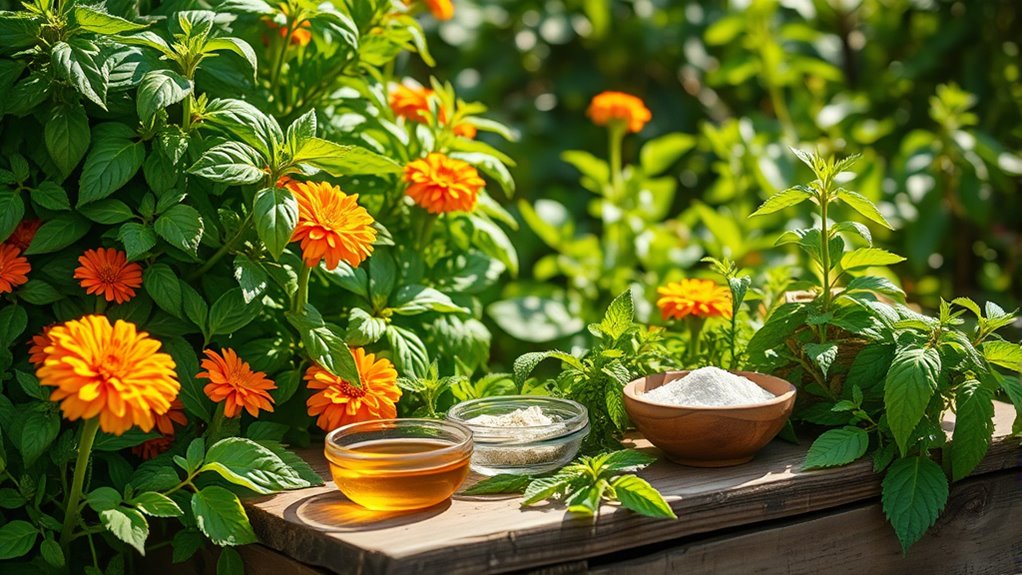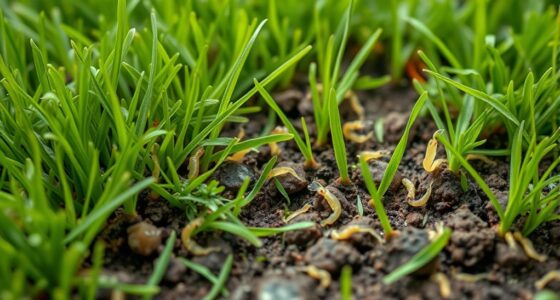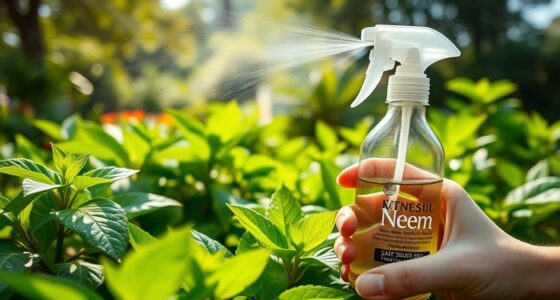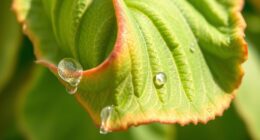To effectively control pests organically, you can use methods like introducing beneficial insects such as ladybugs and lacewings, which naturally prey on pests. Planting flowers like marigolds or dill attracts helpful insects, while natural repellents like neem oil, garlic, and hot pepper sprays can deter pests. Maintaining good garden hygiene and encouraging a healthy ecosystem help reduce pest problems over time. Keep exploring to discover more eco-friendly strategies that keep your garden pest-free without chemicals.
Key Takeaways
- Introduce beneficial insects like ladybugs and lacewings to naturally suppress pest populations.
- Use natural repellents such as neem oil, garlic, and hot pepper sprays to deter pests effectively.
- Plant diverse flowering plants like marigolds and dill to attract helpful insects and enhance biological control.
- Maintain proper garden hygiene to minimize pest habitats and reduce infestations naturally.
- Implement integrated pest management (IPM) by combining natural repellents, beneficial insects, and healthy plant practices.
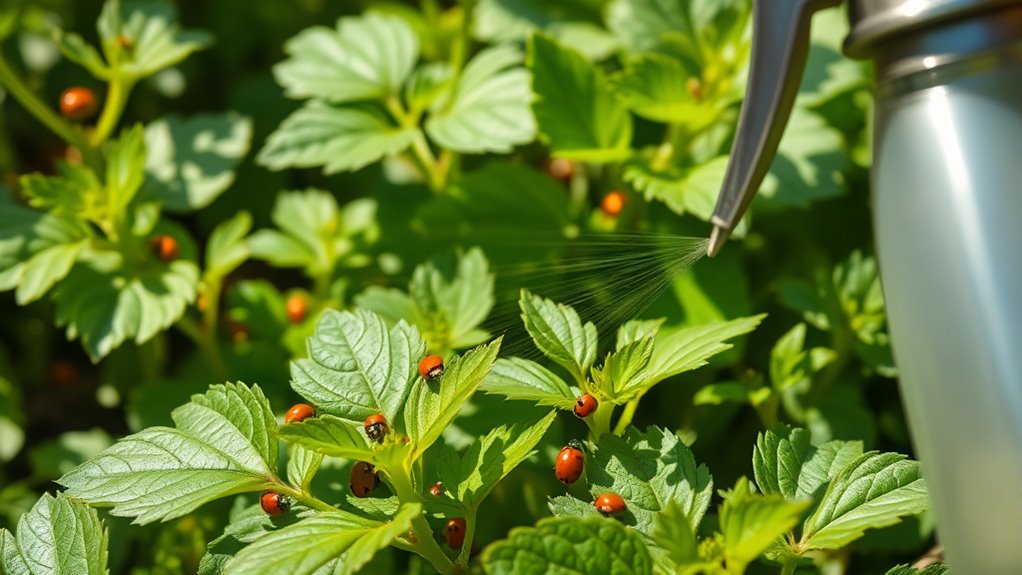
When pests threaten your garden or home, opting for organic control methods offers a safe and eco-friendly solution. Instead of relying on harsh chemicals, you can harness natural strategies that protect your plants and living spaces while preserving the environment. One effective approach involves encouraging the presence of beneficial insects. These natural allies, like ladybugs, lacewings, and predatory beetles, feed on common pests such as aphids, caterpillars, and whiteflies. Introducing or attracting beneficial insects into your garden creates a balanced ecosystem where pests are naturally kept in check. You don’t need to buy or release them in large quantities; planting a diversity of flowering plants, such as marigolds or dill, can naturally attract these helpful insects. Once established, beneficial insects will continue to patrol your garden, reducing pest populations without the need for chemical interventions. Additionally, understanding the impact of climate change on pest populations can help tailor your organic pest management strategies more effectively. Natural repellents also play a fundamental role in organic pest control. These are substances derived from plants, minerals, or other natural sources that deter pests from feeding or laying eggs on your plants. For example, neem oil, derived from the neem tree, disrupts pest feeding and reproduction, making it a powerful natural repellent. Similarly, garlic and hot pepper sprays can deter insects and small critters. Applying these repellents regularly creates a barrier that pests prefer to avoid, especially when combined with proper garden hygiene. Keep in mind that natural repellents are most effective when used as part of an integrated pest management plan, along with encouraging beneficial insects and maintaining healthy plant growth.
Frequently Asked Questions
Are Organic Pest Control Methods Safe for Pets and Children?
You’re probably wondering if organic pest control methods are safe for pets and children. The good news is, many of these methods prioritize pet safety and children protection, using natural ingredients like neem oil or insecticidal soap. These options are designed to be less toxic and safer around your loved ones. Just make sure to follow product instructions carefully to guarantee maximum safety for your pets and kids while effectively managing pests.
How Often Should I Apply Organic Pest Control Treatments?
Back in the day, folks relied on guesswork for pest control, but now you should consider application frequency carefully. You need to monitor the pest life cycle and reapply organic treatments every 7 to 14 days, or as needed. This guarantees you target pests when they’re most vulnerable. Regular application helps maintain control without overdoing it, keeping your home safe and pest-free efficiently.
Can Organic Methods Eliminate All Types of Pests?
You might wonder if organic methods can eliminate all pests. While they’re effective for many, they often aren’t a one-size-fits-all solution. Unlike synthetic chemical alternatives, organic pest control relies on pest-specific solutions that target issues without harming beneficial insects or the environment. For severe infestations or stubborn pests, you may need to combine organic methods with other approaches, but they generally provide a safe, eco-friendly way to manage pests effectively.
Do Organic Pest Controls Leave Harmful Residues?
You might wonder if organic pest controls leave harmful residues. The good news is, they typically don’t, reducing chemical residues that can harm your family or pets. Plus, organic methods have a lower environmental impact compared to conventional pesticides. By choosing organic pest control, you minimize chemical buildup and support a healthier environment, making it a safer, eco-friendly option for managing pests in your home or garden.
Are Organic Pest Control Methods Cost-Effective Long-Term?
When considering if organic pest control methods are cost-effective long-term, you should focus on cost analysis and budget planning. These methods often require upfront investments but save you money over time by reducing chemical expenses, lowering health risks, and preventing pest damage. You’ll find that organic solutions, while sometimes pricier initially, promote sustainable practices and long-term savings, making them a smart choice for your budget and environment.
Conclusion
Think of your garden as a delicate dance floor, where each pest is an unwelcome guest. With these organic methods, you’re the graceful host, guiding away the troublemakers without disturbing the harmony. Like a skilled conductor, use natural tools to keep the rhythm steady and the environment vibrant. When you embrace these eco-friendly strategies, your garden becomes a thriving symphony—balanced, healthy, and alive. Keep conducting your pest control with care, and watch your garden flourish.
